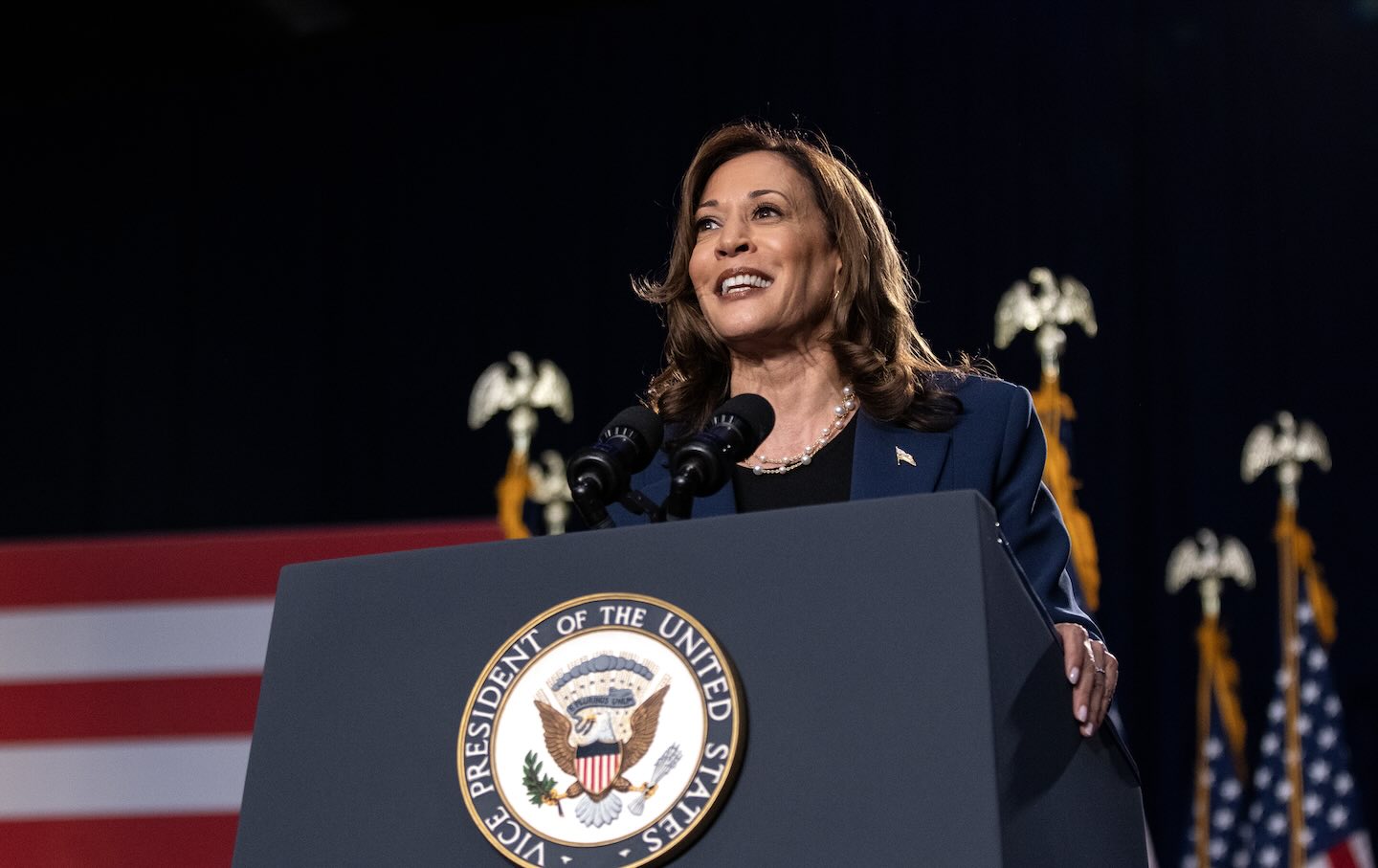In a matter of days, Vice President Kamala Harris cleared the path for the Democratic presidential nomination.

Vice President Kamala Harris speaks to supporters during a campaign rally at West Allis Central High School on July 23 in West Allis, Wisconsin.(Photo by Jim Vondruska / Getty Images)
When President Joe Biden ended his embattled bid for a second term on July 21, he placed Vice President Kamala Harris on a trajectory that could well make her the first woman to win the Oval Office. Harris moved to the top of the ticket in a matter of minutes; key Democrats rushed to endorse her; and she raised a record $81 million within the first 24 hours of her campaign launch. The circumstance is unprecedented, the challenge daunting, but Kamala Harris is up to it.
Despite what Republican presidential nominee Donald Trump and his MAGA cabal may suggest in public, they know this—and they fear her. That’s why, amid a rising chorus of calls for Biden to stand down after a miserable debate performance in June, Trumpworld went oddly quiet. Republicans recognized that Harris—who was quickly identified by The Nation’s own Jeet Heer as the logical successor—would hit the campaign trail with the energy and focus that Biden had struggled to muster. They also recognized that, after four years of claiming that Biden was too old to serve a second term, Trump is now the old man in the race for the presidency.
The twist is that Harris also runs as an exceptionally experienced candidate. The child of civil rights activists who participated during college in demonstrations against South African apartheid, Harris defeated an incumbent Democrat to become San Francisco’s district attorney in 2003, beat a popular Republican prosecutor to become California’s attorney general in 2010, and was elected to the US Senate in 2016.
Harris lost her first presidential bid in 2020, but like Biden in 2008, she emerged as the Democratic Party’s vice presidential candidate. She proved her ability to prosecute Republican lies by trouncing Mike Pence, a governor and former talk-radio host, in their debate—just as Harris will trounce Trump in any fall debates. In office, Harris was mocked by the right—and neglected by pundits—as she took on some of the administration’s toughest jobs. Yet she gained the respect of the people who sustain Democratic presidential campaigns: state and local elected officials and activists, whom she campaigned with in 2022 and 2023. And she did so as “Biden’s top ambassador on issues of reproductive justice,” as Joan Walsh writes in her compelling profile of Harris in the August issue, where she explains how, “without anyone totally noticing it, Harris has been put in charge of outreach to all of the groups of voters—women, Black voters and voters of color, young voters, and voters who care about gun reform”—whom Democrats must mobilize for November.
Harris hasn’t always been a favorite of progressives, as The Nation’s editor, D.D. Guttenplan, acknowledged in a July 4 editorial calling for Biden’s withdrawal. Backing her a day before Biden finally left the race, Guttenplan concluded that Harris was “the only person who can justifiably run on the administration’s record of successes” and who might bring “a fresh approach to the stalemate in Ukraine and the slaughter in Gaza.”
It’s a safe bet that Republicans will run a racist, sexist, and xenophobic campaign against Harris, who would be the first Black woman and the first South Asian American to take the party’s nomination, even if she chooses a white guy as her running mate. Some Democrats fret about the certain attacks, but they need to get over it, just as they needed to get over their uncertainty about whether voters would support “a skinny kid with a funny name” in 2008. Harris is ready for this fight, and Democrats who know how to win see this.
Within hours of launching her campaign, Harris received endorsements from the Service Employees International Union and the American Federation of Teachers. That’s no surprise. Two years ago, after the first of many interviews I’ve done with Harris on labor issues, I wrote that she “displays as much passion [for labor rights] as President Joe Biden.” Harris is ready to put that passion on display as the Democratic nominee. If she couples it with an embrace of Biden’s call to tax the rich in order to expand Social Security, end medical debt, and otherwise tip the balance in favor of working Americans, alongside her commitment to defend abortion rights and democracy, she will be Trump’s worst nightmare.
John NicholsTwitterJohn Nichols is a national affairs correspondent for The Nation. He has written, cowritten, or edited over a dozen books on topics ranging from histories of American socialism and the Democratic Party to analyses of US and global media systems. His latest, cowritten with Senator Bernie Sanders, is the New York Times bestseller It's OK to Be Angry About Capitalism.
The NationTwitterFounded by abolitionists in 1865, The Nation has chronicled the breadth and depth of political and cultural life, from the debut of the telegraph to the rise of Twitter, serving as a critical, independent, and progressive voice in American journalism.